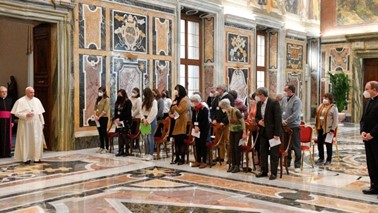Pope meets with leaders of Catholic Action in France
This Thursday, January 13, Francis received in audience representatives of the French teams of Catholic Action, on pilgrimage to Rome for a few days. His reflection was articulated around three verbs, "see, judge, act": the movement's method of rereading the Gospel can today help Christians grow in their commitment to the Church and the world.
 "Apostles today " is the theme of the pilgrimage of these leaders of Catholic Action in France, who came to Rome with Archbishop François Fonlupt of Avignon and President of the Council for Movements and Associations of the Faithful within the Conference of Bishops of France.
"Apostles today " is the theme of the pilgrimage of these leaders of Catholic Action in France, who came to Rome with Archbishop François Fonlupt of Avignon and President of the Council for Movements and Associations of the Faithful within the Conference of Bishops of France.
Being an apostle by recognizing God in your life
To deepen the meaning of this theme, the Pope relied on the three pillars of the rereading of life in the light of the Gospel practiced within Catholic Action: " Seeing, Judging, acting", taken from the Gospel passage of the disciples of Emmaus.
"Seeing" means a moment of "anamnesis", "that is, understanding with hindsight the meaning of who one is and what has been lived, and perceiving how God was present in each moment". It is a question of starting any reflection with an inventory of the situation, and remembering its "family, cultural, Christian" roots.
The Importance of God's Word
"Judging" implies discernment. "This is the moment when we let ourselves be questioned, called into question. The key to this stage is recourse to Sacred Scripture, the Pope said. It is a matter of accepting that one's life be scrutinized by the Word of God." By practicing this, Catholic Action has been able to develop throughout its history "true synodal practices", noted the Supreme Pontiff. Francis therefore encouraged the movements to bring their experience to the synodal process underway in the universal Church. Synodality, he recalled, is a "style to be adopted in which the first protagonist is the Holy Spirit who expresses himself first and foremost in the Word of God, read, meditated on and shared together". It is not "a program to be put in place".
The members of Catholic Action were encouraged to continue to give an important place to the Word of God, as well as to "prayer, interiority, adoration".
Knowing how to answer young people's questions
Finally, "acting" must remind us that action "should always be at the initiative of God". But this requires "fostering God's action in hearts, adapting to the ever-changing reality."
And the Bishop of Rome evokes the evolution of the profile of the members of movements such as those of Catholic Action. They are now "more skeptical of institutions, they are looking for less engaging and more ephemeral relationships. They are more sensitive to affectivity, and therefore more vulnerable, more fragile than their elders, less rooted in faith, but just as much in search of meaning, truth, and no less generous," the Pope noted, mentioning in particular the young. There is therefore a real challenge for Christian movements to "make them grow in love of Christ and neighbour", and to "bring them to more concrete commitment so that they may be the protagonists of their life and of the life of the Church, so that the world may change".
The Holy Father concluded his speech by thanking the members of Catholic Action in France for their "generous service," which the Church "needs more than ever."
Catholic Action refers to an apostolate of the laity organized in two main forms: General Catholic Action and Catholic Action specialized in social circles. These movements were created within the Catholic Church in the 20th century, within the framework of social Catholicism, and aimed at specific categories of society: the Young Christian Workers (YCW), the Mouvement chrétien des retraités, the Christian Movement of Cadres and Leaders are some examples.
Adelaide Patrignani – Vatican City



